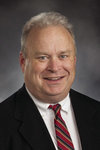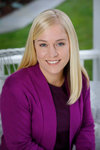

The race between Rep. Jim Walsh (R-Aberdeen) and his Democratic challenger Erin Frasier for the 19th Legislative District presents a clash of personalities.
Walsh won the 19th District, a historically blue area that includes a broad swath of Southwest Washington, by 559 votes in 2016 by outpolling Longview Democrat Teresa Purcell. He was the first Republican elected from the district in decades.
Walsh’s booming voice brimmed with intensity during a forum in Longview on Tuesday night as he touted his 2016 election as a move toward stronger conservative values and a new form of representation.
“I was elected two years ago and really upended the way legislators came to office that year,” he told the crowd at Canterbury Inn. “For a long time, there had been a system in place ... and the approach to legislating was play nicely with the big bosses and see what we can get. I’ve changed all that in the last couple years. I advocate for this district ... in a more direct and aggressive way.”
Meanwhile, soft-spoken Frasier said her experience living in rural Lewis County and working on the State Board for Community and Technical Colleges helps her engage with different groups to find compromises.
“I spent over a decade working for Grays Harbor College and served both Pacific and Grays Harbor counties, specifically focused on access to education,” she said. “(This included) a whole lot of engagement with the community, which really instilled in me the power that we have in these communities to come together and make things happen when we don’t have very many resources.”
The race is a nailbiter. Walsh barely outpolled Frasier, a relative unknown, during the August primary, winning by a mere 136 votes, or about 0.4 percentage points. They were the only two candidates to file for the position, so both moved onto the general election. But Frasier’s strong showing prodded the Democratic Party to pour money into her campaign in hopes of recapturing the seat.
Frasier has raked in about $329,000 in cash and in-kind contributions, $220,000 of which came from Democrat Party affiliated organizations, according to state Public Disclosure Commission reports. In addition, she got nearly $24,000 from 14 different union groups. She had spent about $306,000 as of Friday.
Walsh has raised about $184,000, including about $53,500 from Republican Party organizations. He had spent about $127,000 as of Friday.
During an editorial board meeting Tuesday with The Daily News, Walsh said the 19th District is on the brink of success and that the area needs large industrial projects to combat unemployment, addiction and homelessness. The state Department of Ecology’s decision to deny permits for Millennium Bulk Terminals’ proposed Longview coal export facility “will stand as a bad mark of regulatory excess,” he said.
He said he will continue to “fight the good fight” for proposed industrial projects such as the coal export terminal, a methanol plant in Kalama and a fertilizer plant in Longview.
Frasier said she wants to focus on existing small- and medium-sized local businesses by helping them to expand instead of relying only on larger industries.
“We tend to sit back and wait for industry to come and be the savior of our communities here in the 19th,” she said. “They may come in and offer a couple hundred jobs, but what happens if they can’t sustain that and they move on? Then we have to deal with the aftermath.”
She demurred about whether she supports the coal or methanol projects, agreeing with Walsh that the permitting process is “broken” and that projects that meet regulatory requirements should receive permits.
They also both oppose the proposed carbon fee initiative, citing the burden it would place on constituents in the 19th District due to higher gas prices. (The 19th District includes Kelso and Cowlitz County west of the Cowlitz River, all of Wahkiakum and Pacific counties and parts of Lewis and Grays Harbor counties.)
Frasier said, however, that the initiative has sparked constructive conversations around ways to reduce carbon emissions. She said she would like to create incentives for businesses to transition to greener industries and train the younger workforce in future technologies.
Walsh said he wants to “hold the line” against new taxes, including income and capital gains taxes.
He also said he wants to address mental health problems by creating smaller, community-based facilities instead of sending people to central places like Western State Hospital.
Frasier said she wants a “holistic” approach to addressing social problems such as homelessness or addiction because people often have more than one barrier to success. Greater communication and interaction between resources and agencies will help people overcome all of their barriers, she said.
She added that, as a gun owner, she’s frustrated with how polarized the debate around gun violence has become.
“I’m not after anybody else’s guns,” she said. “Because of my experience, I may have a better ability to facilitate conversation where it needs to be had because the root cause is ... about mental health, safety and education more than anything else.”
Walsh said he secured funding for projects with Community House on Broadway, Housing Opportunities of Southwest Washington and the West Port Marina by being assertive.
“I was able to get that done, and it wasn’t because of asking nicely. It was because of pushing for a project that is essential for this area,” he said.
Frasier said engaging all voices makes legislation more successful and permanent.
“If we keep polarizing things and the decisions come out of whoever has the most power, then we don’t have the buy-in and momentum to keep things so all we’re going to do is keep flipping decisions depending on who is in power,” she said. “I will always strive to ensure we have all voices at table before decisions are made.”